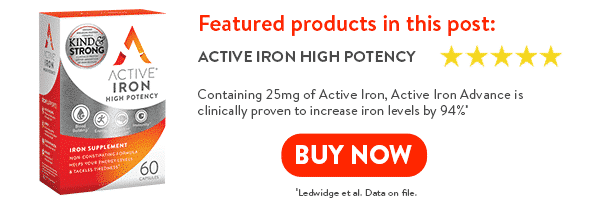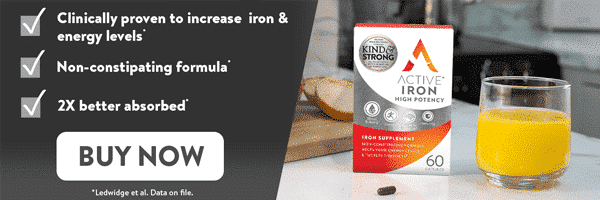Iron Supplements for pregnant women – The Active Iron guide.

When pregnant there is a lot to focus on to make sure you are giving your body the right nutrients to support both your growing baby and your body during the process. Here we will break down what iron is, what it does and why it is important, as well as giving advice on where to get that essential iron from during your pregnancy. We’ll cover the following key topics and frequently asked questions:
Why is iron important during pregnancy?
Iron is an important mineral during pregnancy. After all, growing another human and a temporary organ – the placenta – requires significantly more blood. In order to increase blood volume, and therefore healthy red blood cells, your body needs iron. Hemoglobin is the protein in the red blood cells that carries oxygen to your tissues and your baby and your body needs iron to increase the production of red blood cells. During pregnancy your blood volume increases up to 50%.

How much iron do pregnant women need?
Global guidance on this varies, but most agree pregnant women need a minimum of 27mg of iron intake per day. Reaching almost double the recommendations for non-pregnant women.
NHS guidelines recommend:
8.7mg a day for men over 18
14.8mg a day for women aged 19 to 50
8.7mg a day for women over 50
Globally around 2.1 billion people are low in iron, affecting low, middle and high income countries.
When looking at how to get enough iron intake it’s important to first consider diet and what you can do to optimise your iron intake.
Foods containing iron include:
- Red meat
- Fish
- Lentils and beans, such as red kidney beans, black beans and chickpeas
- Peas
- Nuts and dried fruit – such as dried apricots.
- Dark leafy green vegetables such as spinach
- Dark chocolate

Iron levels for pregnant women
As your baby continues to grow and develop throughout pregnancy, they need a constant supply of blood, oxygen, and nutrients. Some mothers become short of red blood cells leading to low iron.
You have an increased chance of becoming low in iron if you:
- Have short spaces between pregnancies – usually within a year
- Are carrying more than one baby
- Follow a vegan or vegetarian diet
- Are under the age of 20
- Have had episodes of bleeding during pregnancy
- A history of heavy periods – meaning you may start your pregnancy already deficient
By understanding and identifying risk factors you’re better able to prevent low iron. It’s always worth discussing this with your doctor as early into your pregnancy as possible. Taking a low dose iron supplement early in pregnancy can help prevent low iron.
Low iron in pregnancy
Common symptoms of low iron can be dismissed as “usual” pregnancy symptoms. The most common symptoms of low iron include:
- Fatigue and lack of energy
- Weakness
- Feeling out of breath
- Pale skin
- Heart palpitations
As getting enough iron is an important part of a healthy pregnancy, expectant mothers will have their blood tested for adequate iron levels. This enables an opportunity for clinicians to support mothers to increase their iron levels ahead of birth, supporting the health and wellbeing of both mother and baby.
Some of the complications low iron can cause are premature birth, lower birth weight, and an increased chance of bleeding after birth for the mother. Increasing research supports the impact of low iron on mental health.
Can you take iron supplements while pregnant?
Yes, if low iron is diagnosed by your midwife or doctor you will be prescribed a high dose iron. Usually Ferrous Sulphate 200mg to be taken up to three times per day. High dose iron can often cause mothers to develop unpleasant side effects, such as nausea, constipation, and very dark colored stool.
If you have identified any risk factors for low iron, or think that you may not be gerting enough iron from diet alone, then taking a well-absorbed iron supplement such as Active Iron can help support you avoiding the development of low iron levels.
Some mothers may not meet the general threshold for low iron, when having a blood test, but may still become symptomatic. This is likely due to the fact humans are unique and interpretation of results is currently based on a segment of the population that may not be reflective of the entire population tested. In other words, it’s important to look at yourself as an individual and note how you feel, what you eat, and ask about how close you are to developing low iron. A result of 10.5 or above is considered normal; if you have a result of 10.8 at 12 weeks, it’s likely that by 28 weeks you will have become low iron. It is also important to note that iron requirements may increase as you move through the trimesters, so your iron levels may change drastically in between your booking blood test and week 28 blood tests.
Are iron supplements beneficial in pregnancy?
Many mums are unable to get enough iron from diet alone, for various reasons, whether they be dietary choices or food aversions in pregnancy, which is most common in the first trimester. Mothers often find they lose cravings for iron rich foods. There is often around a 16 week gap between tests and by that point a woman may have already become low in iron.
In these cases taking a supplement, such as Active Iron may help prevent haemoglobin and ferritin levels from dropping. By preventing this drop you can avoid the need for such high dose iron. In some cases, mother’s iron levels have dropped so low that a more invasive procedure is recommended. This is known as Ferrinject and requires a brief hospital admission and an intravenous drip.
What are the benefits of Iron Supplementation for pregnant women?
Iron supplementation can help prevent symptoms that are associated with low iron levels such as tiredness or breathlessness, and can improve energy levels throughout pregnancy. For those not able to get enough iron through diet alone, supplementation is the best way to prevent requiring a high dose prescription or the more invasive treatment previously mentioned. Once iron levels have dropped below an expected threshold you cannot replenish through diet alone.

How much iron is in pregnancy supplements?
Not all iron supplements are the same. In fact, some prenatal supplements may not contain sufficient iron to maintain iron levels during pregnancy. Research by the World Health Organization estimates that up to 40% of pregnant women have low iron levels during their pregnancy.¹
Most liquid iron supplements contain a much lower dose of iron which is why they can avoid these common side effects. Although this is a great benefit, they often do not provide sufficient iron to increase iron levels with some only containing 5mg iron per serving.
Active Iron’s products contain 100-179% of the recommended daily allowance of iron, with Active Iron High Potency containing 25mg of iron which is a higher dose than many well known pregnancy supplements. Active Iron is also better absorbed and clinically proven to increase iron levels. Check your supplements carefully to make sure they are clinically backed and have the right balance of nutrients for your body to absorb the iron needed.
Why should women take iron supplements during pregnancy?
Getting enough iron and focusing on intake is an important part of a healthy pregnancy. It is one of the key markers checked by your healthcare professional during your check ups for a reason, there are many complications that can arise during your pregnancy and towards the end of your pregnancy if you become low in iron.
To avoid low birth weight babies, premature birth and heavy bleeding after birth you must make sure your iron levels are healthy throughout your pregnancy. As it is often difficult to maintain iron levels through diet alone, iron supplements are an easy and effective choice for your healthy pregnancy.
The best iron supplement for pregnant women
Absorption of iron is absolutely key, as with any other supplement. If the body is unable to absorb key vitamins and minerals you won’t notice any changes and will remain low or deficient.
The second most important factor to consider with supplementation is whether mothers are willing and able to take a supplementation. One study revealed that 50 percent of people stop taking iron due to the unpleasant side effects. For example, constipation is a symptom many pregnant women have to contend with regardless of what they do to prevent and manage it. Add an iron supplement that exasperates constipation and, of course, expectant mothers do not take it.
Active Iron’s is clinically proven to increase iron levels by 94% in 6 weeks.. Their non-constipating formula helps avoid gut irritation and avoid common symptoms such as nausea and constipation.
Iron supplements for pregnant women: Conclusion
In summary, iron is key during your pregnancy and taking a clinically proven supplement is an effective way to maintain your health and iron levels.
Active Iron helps to support your iron requirements throughout pregnancy while helping to avoid the side effects many women experience with other supplements. This means you can avoid the fatigue and breathlessness associated with low iron levels and reduce the risk of complications during your pregnancy and birth, and the period after, in which your body is healing.
If you take Active Iron supplements throughout pregnancy your body will be better equipped to supply you and your baby with all that extra blood while keeping you feeling well and strong.
¹ WHO global anaemia estimates: Anaemia in women and children (2021)



